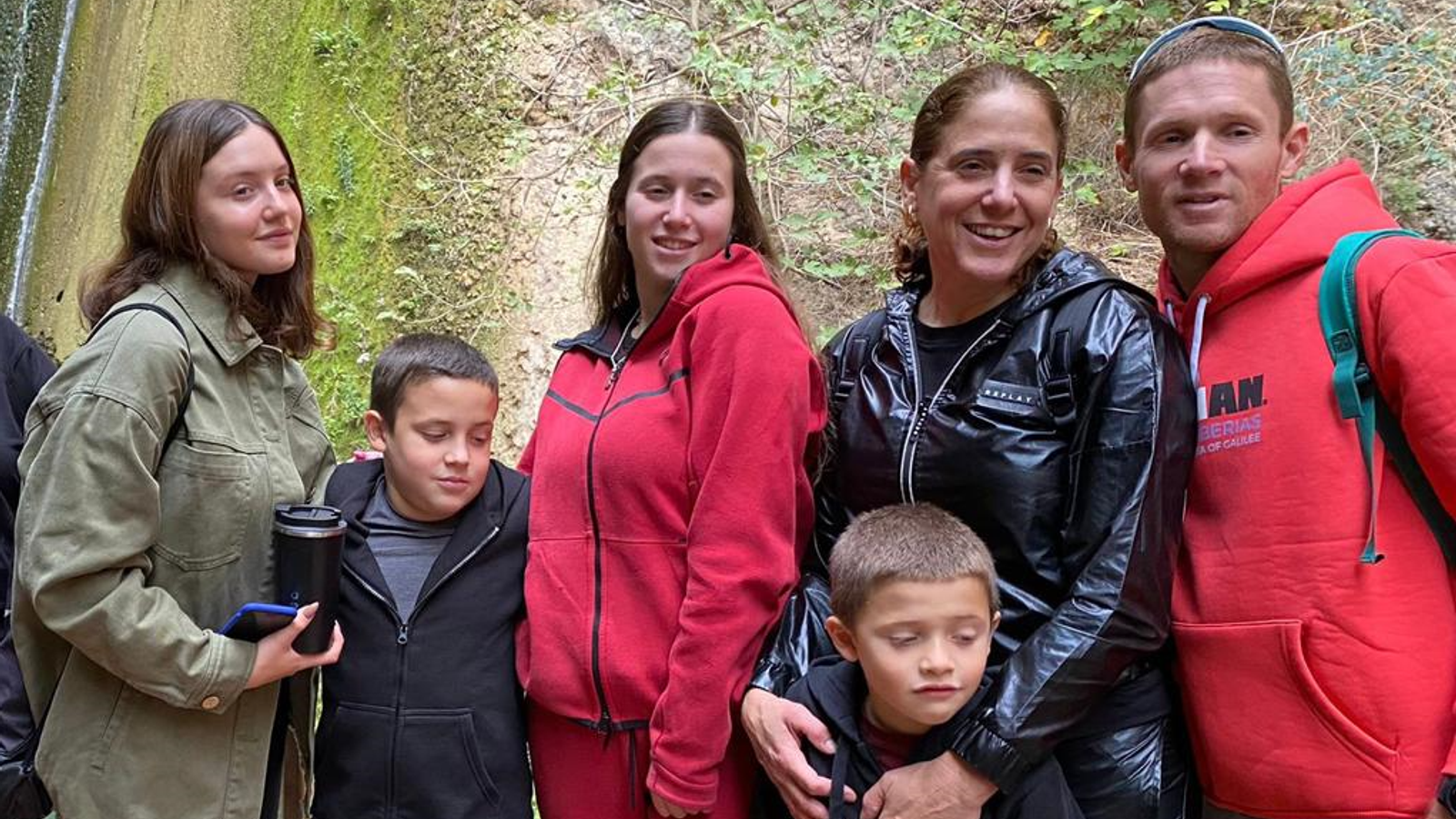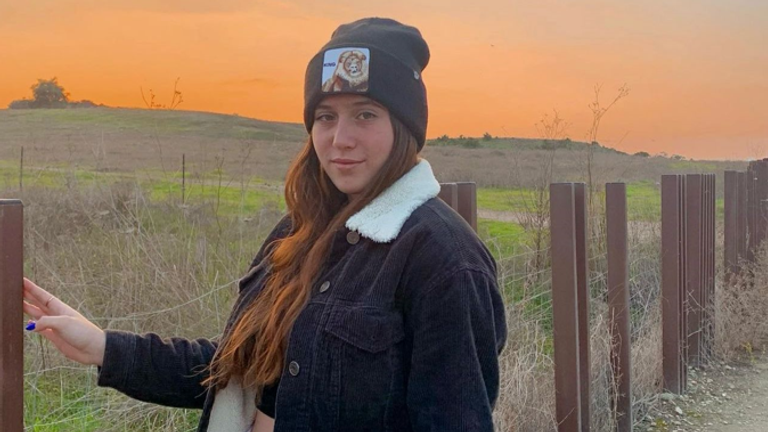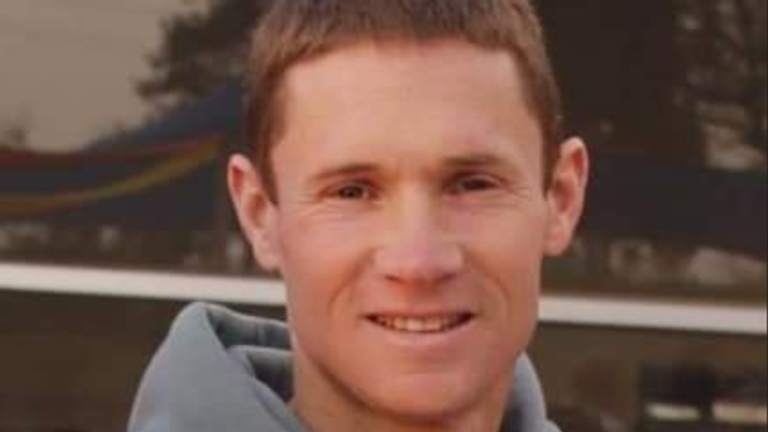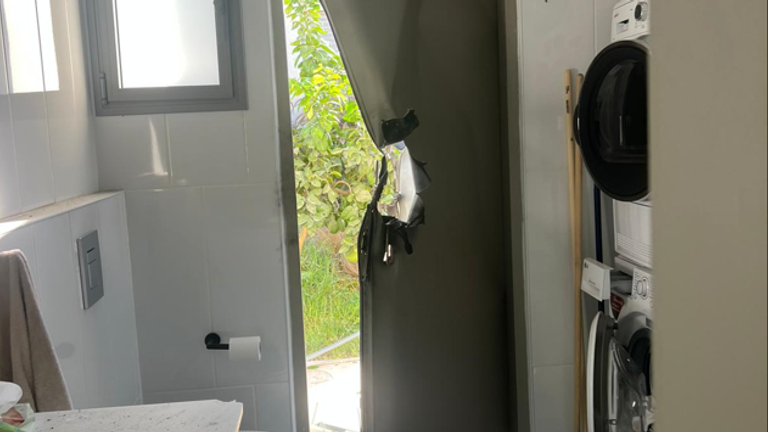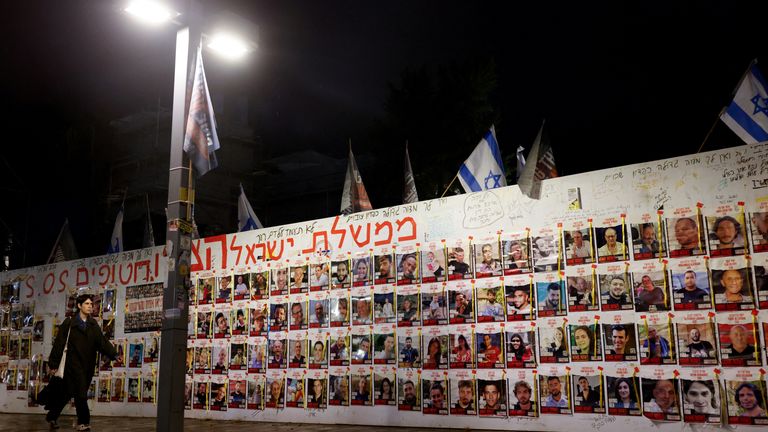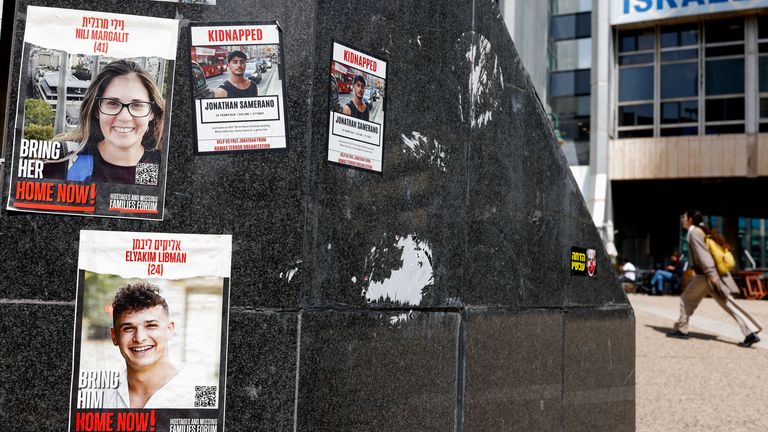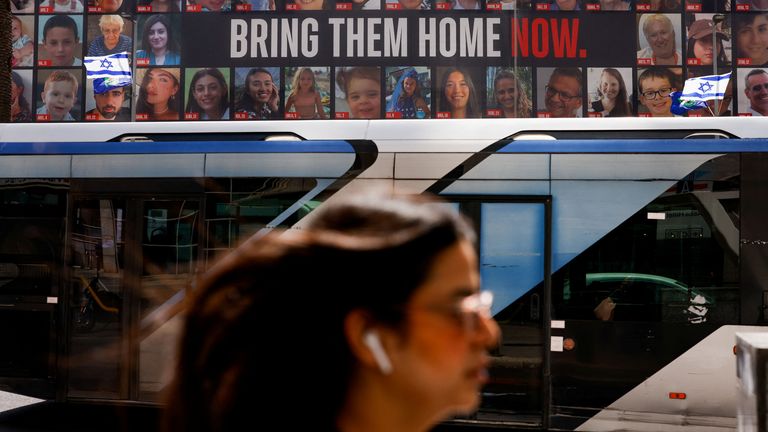The death of Chen Almog-Goldstein’s 20-year-old daughter Yam was just the start of her ordeal.
The final time Chen saw her, Yam was convulsing on the floor of their home after being shot in the face by a Hamas terrorist; minutes earlier, Chen’s husband Nadav had also been killed by a bullet in his chest. They were forced to step over his body as they were led out of the safe room at gunpoint. There was no time to say goodbye.
“He [Nadav] took this wooden plank and he stood there at the entrance to the safe room to protect his family. And then they broke into the safe room,” Chen recalls.
“Maybe he managed to hit them with this wooden plank? I remember that I turned around and there were four or five of them inside the safe room yelling, and they shot Nadav in the chest from very close range in two or three places. He was lying like that with his arms up. He was quiet. I thought that maybe he was pretending.”
Outside she said it was “quiet, kind of idyllic” and they thought Israeli forces would come to their rescue any minute. It didn’t happen.
After first trying, but failing, to start the family’s hybrid car, the Hamas gunmen bundled Chen and her three surviving children into another vehicle and left kibbutz Kfar Aza.
Hostages for seven weeks
For seven minutes, on the 7 October, they were driven into Gaza. They would remain there for seven weeks, hostages from Israel’s darkest day.
CCTV from the border fence shows the red SUV driving fast along the road and then turning off, onto a dusty field where Nadav used to train for triathlons.
“I remember the looks on the children’s faces. They were looking at me with these very deep looks and they said, ‘Mom, what happened to your lips?’ Because my lips turned completely white. I was shocked,” Chen said.
‘Our abductors were overjoyed’
“Near the fence they stopped and they started putting bodies into the trunk of the car and Agam [her son] said to the boys, don’t look back, not to look back. Our abductors were overjoyed, they took a selfie picture, they took pictures of us in the backseat,” she said.
“I remember a Red Cross ambulance, and I was looking and kind of begging with this look that was asking for help. And he looked back at me with this helpless look, and that was it.”
After switching cars they drove to a house behind closed gates and went down a tunnel shaft. For the first time, nine-year-old Tal began to cry.
For most of their time in Gaza, the four of them were watched over by the same six guards. Other than brief glimpses of the sea, they weren’t sure where they were in Gaza.
They spoke to their captors and conversed in broken English or Hebrew and there were moments of banter as well as heated arguments, but on the whole they stayed quiet, either as a survival mechanism or because they were ordered to.
“They kept shushing the kids. They couldn’t cry or fight, they had to keep quiet so that the neighbours won’t hear us or if any [Israeli] soldiers were to come close. If we would cry, we had to quickly either snap out of it or not show it,” Chen recalled.
At times they were able to listen to Israeli radio and hear news of the world beyond and war around them. One day, by complete chance, they caught an interview with Chen’s father and brother, speaking about them. “Sorry for the loss of Yam and Nadav,” the interviewer concluded. For Chen, it was the final confirmation of their deaths.
Chen, Agam, Gal and Tal were regularly moved, from apartments above ground to tunnels below.
‘I only showered once in seven weeks’
“In the tunnels there’s a lot of sand and the sand gets into your mouth and there’s this smell that’s mouldy. It’s very humid there and sometimes there’s a power outage and the fan has to work because there’s not much air,” Chen said.
“At the beginning there was more food. And they tried to supply food because they wanted us to be okay. They kept saying that, you know, they were taking care of us, that they’re protecting us. We understood that we were important to them.
“The conditions in the apartments were not easy. The windows, they would try to open them a bit, but most of the day the windows were closed with these heavy curtains. So as far as air, ventilation, sunlight. We didn’t have much of any of that.
“There’s hardly any running water in the tap, if there was then it wasn’t fresh water. The smell in the toilet was really, really, bad. There were entire days without electricity. When there was running water, you needed to decide who’s going to shower. The kids showered. Throughout those seven weeks, I only showered, once. I wanted the children to shower.”
The fighting was often close by, the sound of airstrikes frightening. There were times that Chen worried her family might be killed by Israeli forces – not their captors.
It was the worst when the sun went down and everything went dark.
“There was fierce fighting going on and the apartments next to us, there was [a] blast and they were damaged. Sometimes in the middle of the night, in darkness, they took us out to the street and we were under tremendous danger from our forces as well.
“It was really scary and dangerous. We were really in danger. When they took us out to the street and we walked down the street and we saw the devastation and destruction, it was really hard.
“You’re in the middle of a war, it’s a battlefield. That’s not that I was thinking, ‘oh, good for us, we showed them’. It was terrible. It was terrible to see the destruction, the devastation, the poverty, the children in the streets.”
Read more from Sky News:
Netanyahu defiant on Rafah invasion as officials meet for ceasefire talks
Biden and Netanyahu hold first phone call in a month
Chen describes seeing weapons everywhere, guns hidden under cushions, grenades and knives.
As the weeks wore on, their guards became increasingly stressed as Israeli forces started closing in.
“We also saw them missing their families. They were worried about their families, their wives. They were hoping for the war to be over. They were hoping for a ceasefire.”
On 26 November, two days into a week-long ceasefire, Chen and her three children were released.
‘It was so humiliating and scary’
“It was like a very long day, a lot of waiting time. We waited in this car for five hours. They said that they were waiting to receive a signal, the phone call from the Red Cross.
“We had to get out of the car and walk and everybody around us, you know, the masses were taking pictures of us. It was so humiliating, humiliating and scary.
“And then when we were passed into the hands of the Red Cross and we started driving away, then the masses clung to the jeep, and somebody even climbed on top of it with this stick next to the driver and kept yelling. And then, like, you know, with the magic wand, all of a sudden the Red Cross jeep stopped.
“And then we were transferred into the hands of the IDF, into armed forces. And it was truly moving and we were both happy and sad because we knew that Nadav and Yam were not waiting for us.”
On Monday, fresh ceasefire talks resumed in Qatar. Hamas has softened its demands but the Israeli government has still described them as “unrealistic” and “delusional”. Chen says a new truce is urgent to get the remaining hostages out, many of whom are badly injured.
“We need to do everything possible in order to release the people who are still there as quickly as possible. We were there towards the end with the young women who were injured physically, some complex wounds, some of them with a severed fingers, with holes in their hands and they did everything they could in order to function and to be okay in a very wrong, distorted reality.
“We need to do everything for them because they’re doing everything they can over there. We need to do everything possible in order to release them, to bring them back to their families, to bring them back to our country.”
